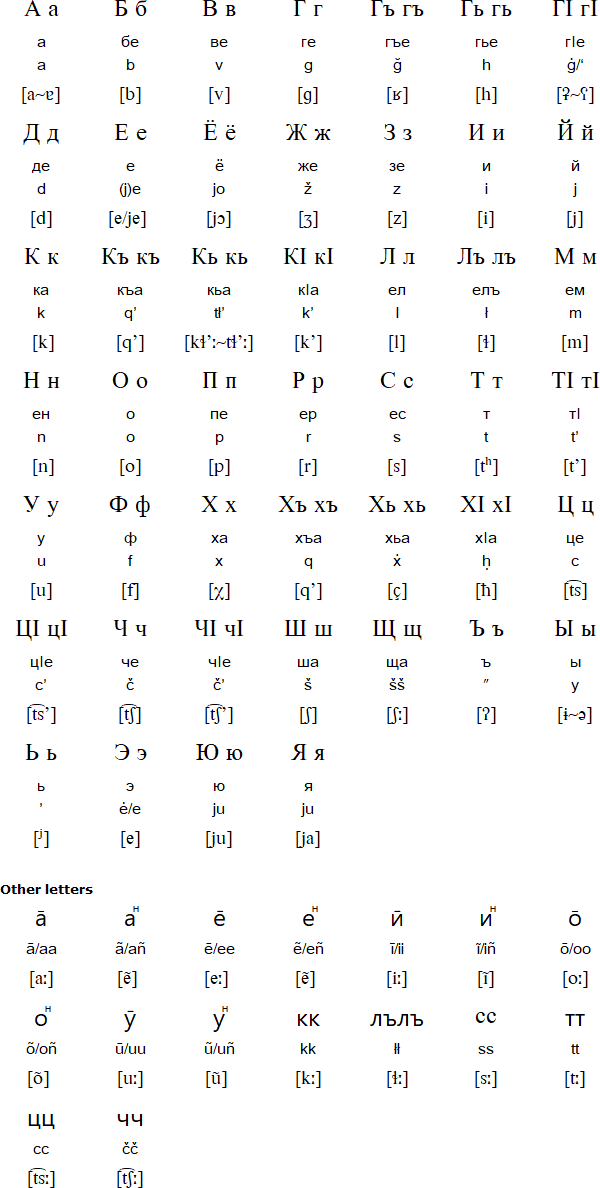Godoberi is a member of the Avar-Andic branch of the Northeast Caucasian language family. It is spoken by about 3,000 people in the southwest of the Republic of Dagestan in the southwest of the Russia Federation. It is spoken particularly in the villages of Godoberi (Gjudu in Godoberi) and Zibirhali (Shalu in Godoberi), on the left bank of the Andi-Koisu River in the Botlikh Region, and also in villages in the Khasavyurt, Tarumovsky and Kizlyar regions of Dagestan.
Godoberi is also known as Ghodoberi, Godoberin or Qibdili mitstsi. Native speakers call it ГъибдилIи мицци (Ghibdilhi mittsi).
There are two main dialects: Godoberi and Zibirhali, which differ mainly in pronunciation. Godoberi has borrowed words from Avar, Turkish and Arabic, and particularly from Russian during the 20th century. The most closely-related languages to Godoberi are Chamalal and Botlikh.
Godoberi is spoken mainly by adults. It is used in schools, but is rarely written, and there is no standard orthography and it is not officially recognised. It was first documented in the 1770s.

Download an alphabet chart for Godoberi (Excel)
Гьаб идя макъалабелълъи серия гъибдилълъи миццихъи Википедиялълъи пробный разделлъи сабалъу. Биттиб гIуцIидибу дайичIу вклад гьичIи пайдаяб букIиссу. Бегъу речIуха макъалабе букIалъара, гъибдилълъи Википедия гIуцIидя. Игьибу дайи гьаб разделчIу букIикъалълъи, тIорда гьава букIалибу дайибе ВикипедиячIу букIиссу (лелябеди копиравать игьи буккавучи).
Source: https://incubator.m.wikimedia.org/wiki/Wp/gdo/Main_Page
Sample text provided by Jin Wei Hii
Information about Godoberi | Numbers in Godoberi
Information about the Godoberi language
http://www.eki.ee/books/redbook/godoberis.shtml
http://en.wikipedia.org/wiki/Godoberi_language
https://ru.wikipedia.org/wiki/Годоберинский_язык
https://minlang.iling-ran.ru/lang/godoberinskiy-yazyk
Aghul, Akhvakh, Andi, Archi, Avar, Bagvalal, Batsbi, Bezhta, Botlikh, Budukh, Caucasian Albanian, Chamalal, Chechen, Dargwa, Godoberi, Hinukh, Hunzib, Ingush, Kaitag, Karata, Khinalug, Khwarshi, Kryts, Kubachi, Lak, Lezgian, Rutul, Tabassaran, Tindi, Tsakhur, Tsez, Udi
Abaza, Abkhaz, Adyghe, Aghul, Akhvakh, Akkala Sámi, Aleut, Altay, Alyutor, Andi, Archi, Assyrian / Neo-Assyrian, Avar, Azeri, Bagvalal, Balkar, Bashkir, Belarusian, Bezhta, Bosnian, Botlikh, Budukh, Bulgarian, Buryat, Chamalal, Chechen, Chelkan, Chukchi, Chulym, Chuvash, Crimean Tatar, Dargwa, Daur, Dolgan, Dungan, Enets, Erzya, Even, Evenki, Gagauz, Godoberi, Hinukh, Hunzib, Ingush, Interslavic, Itelmen, Juhuri, Kabardian, Kaitag, Kalderash Romani, Kalmyk, Karaim, Karakalpak, Karata, Karelian, Kazakh, Ket, Khakas, Khanty, Khinalug, Khorasani Turkic, Khwarshi, Kildin Sámi, Kili, Komi, Koryak, Krymchak, Kryts, Kubachi, Kumandy, Kumyk, Kurdish, Kyrgyz, Lak, Lezgi, Lingua Franca Nova, Lithuanian, Ludic, Macedonian, Mansi, Mari, Moksha, Moldovan, Mongolian, Montenegrin, Nanai, Negidal, Nenets, Nganasan, Nivkh, Nogai, Old Church Slavonic, Oroch, Orok, Ossetian, Pontic Greek, Romanian, Rushani, Russian, Rusyn, Rutul, Selkup, Serbian, Shor, Shughni, Siberian Tatar, Sirenik, Slovio, Soyot, Tabassaran, Tajik, Talysh, Tat, Tatar, Teleut, Ter Sámi, Tindi, Tofa, Tsakhur, Tsez, Turkmen, Tuvan, Ubykh, Udege, Udi, Udmurt, Ukrainian, Ulch, Urum, Uyghur, Uzbek, Veps, Votic, Wakhi, West Polesian, Xibe, Yaghnobi, Yakut, Yazghulami, Yukaghir (Northern / Tundra), Yukaghir (Southern / Kolyma), Yupik (Central Siberian)
Languages written with the Latin alphabet
Page last modified: 15.04.24
[top]
You can support this site by Buying Me A Coffee, and if you like what you see on this page, you can use the buttons below to share it with people you know.

If you like this site and find it useful, you can support it by making a donation via PayPal or Patreon, or by contributing in other ways. Omniglot is how I make my living.
Note: all links on this site to Amazon.com, Amazon.co.uk
and Amazon.fr
are affiliate links. This means I earn a commission if you click on any of them and buy something. So by clicking on these links you can help to support this site.
[top]